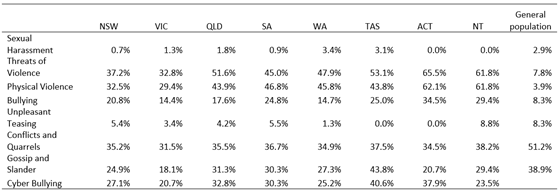
Australian principals are struggling with the highest burnout rates in a decade, a national survey of the nation’s school leaders has found.
The Australian Principal Occupational Health and Wellbeing Survey – conducted by the Australian Catholic University’s Institute for Positive Psychology and Education’s (IPPE) – studied the responses of 2,590 school leaders across all states and territories to get a better understanding of how the profession is faring under the pressures it faces.
According to the latest data, principals and their deputies worked on average at least 55 hours a week, while a quarter of those reported working more than 60 hours a week.
In a more disturbing finding, the number of school leaders being threatened or physically attacked on the job is rising.
A staggering 44% of leaders were threatened and four-in-10 were subjected to physical violence – the second-highest incidence since the survey’s inception in 2011. Thirty-nine per cent of principals reported being physically attacked on the job during 2021.
The study also found 29% of school leaders received a “red flag” alert email, which are generated and sent to the report’s author when a principal answers ‘yes’ to a statement like ‘In the past week I’ve felt like harming myself’.

Progress is being made, but not enough
Co-chief investigator IPPE Professor, Herb Marsh, said that while soaring demands on school bosses are unsustainable, valuable work by professional associations and government jurisdictions is being done.
“Priorities in supporting principal and teacher health and wellbeing are underway in Victoria, Northern Territory, and NSW. Further conversation would be useful in the area of workload sustainability,” Professor Marsh told The Educator.
“Comments from survey participants identify the need to rethink administrative work that does not have student learning at its core. Workload volume is the highest source of stress, so action to reduce and change this is urgently needed.”
‘The solution requires a collective effort’
ACU investigator and former principal, Dr Paul Kidson, said the wider community needs to be part of the solution.
“We need the wider community to be part of the solution. Our data shows that principals are committed and find the role very satisfying, even under trying circumstances,” Dr Kidson told The Educator.
“Families and students can support schools and their leaders through showing respectful behaviours we would expect in wider society. These behaviours are not accepted in contemporary workplaces, and there are not acceptable in schools, either.”
Dr Kidson said “a collective effort right across society” is needed.
“Our data shows that school leaders seek the best for their schools, so let’s ask, ‘how can I support school leaders in what is one of the most significant roles for the health, wellbeing, and future of our nation?’”
However, the report did find a powerful silver lining. IPPE co-chief investigator, Dr Theresa Dicke, said a significant 82% of educators who participated in the survey reported increased connection with their school families.
“Schools experienced many critical moments in the last few years. We saw through remote learning that school communities are central to social connectedness,” Dr Dicke told The Educator.
“Principals worked very hard to communicate clearly about when remote learning might commence and conclude, and how families and schools can together support students during remote learning. Families appreciate this, as it helps give certainty during stressful times.”
Dr Dicke said families should have confidence that school leaders are committed to the best for students, as the university’s data shows.
“They can continue to build strong and positive partnerships with school leaders. This should lessen the inappropriate behaviours reported by some school leaders in our survey.”
'More can and must be done'
Australian Primary Principals Association president, Malcolm Elliott, said the survey data "should be the catalyst for meaningful, systemic change."
“The time is long overdue for governments to welcome to the table those who have the most workable ideas for how to re-design a cracked system – the principals," he said.
Australian Secondary Principals’ Association president, Andrew Pierpoint, agreed, saying "more can and must be done".
“We appeal to parents and the community to remain calm and supportive as we transition back to life after COVID and we ask governments to authentically engage with principal associations to problem solve educational issues," Pierpoint said.
"The Association commends any actions undertaken by education authorities around the country on improving principal wellbeing and encourages a continuing and ongoing focus in the hope of improving the data in the future."


